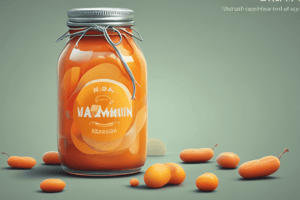Podcast
Questions and Answers
What can lead to a deficiency of vitamin D?
What can lead to a deficiency of vitamin D?
- Regular physical activity
- Consuming more dairy products
- Increased vitamin D from food sources
- Limited exposure to sunlight (correct)
What are the two types of vitamins?
What are the two types of vitamins?
- Water-soluble and Fat-soluble (correct)
- Cyclic and Linear
- Organic and Inorganic
- Essential and Non-essential
Which vitamin is primarily important for blood clotting?
Which vitamin is primarily important for blood clotting?
- Vitamin K (correct)
- Vitamin E
- Vitamin C
- Vitamin A
Which vitamins are considered fat-soluble?
Which vitamins are considered fat-soluble?
What is a common deficiency symptom of Thiamin (B-1)?
What is a common deficiency symptom of Thiamin (B-1)?
What food is commonly associated with Vitamin B-12?
What food is commonly associated with Vitamin B-12?
What is the RDA of Vitamin A for males?
What is the RDA of Vitamin A for males?
What can excess Vitamin A cause?
What can excess Vitamin A cause?
Which vitamin acts as a blood thinner?
Which vitamin acts as a blood thinner?
What is a key role of folic acid in the body?
What is a key role of folic acid in the body?
What is one of the health benefits of Vitamin D?
What is one of the health benefits of Vitamin D?
Which of the following is a food rich in Vitamin A?
Which of the following is a food rich in Vitamin A?
What deficiency symptom is associated with Vitamin C?
What deficiency symptom is associated with Vitamin C?
Which food is not a good source of Vitamin D?
Which food is not a good source of Vitamin D?
What condition can arise from a deficiency in Vitamin A?
What condition can arise from a deficiency in Vitamin A?
Which mineral is categorized as a trace mineral?
Which mineral is categorized as a trace mineral?
How much Vitamin D is recommended for individuals over 70?
How much Vitamin D is recommended for individuals over 70?
What is one of the symptoms of too much Vitamin A?
What is one of the symptoms of too much Vitamin A?
What is a main function of Vitamin E?
What is a main function of Vitamin E?
Which of the following vitamins is not stored in the liver?
Which of the following vitamins is not stored in the liver?
What is one important function of sodium in the body?
What is one important function of sodium in the body?
What is the recommended daily intake of sodium for adults?
What is the recommended daily intake of sodium for adults?
What percentage of calcium in the human body is stored in bones?
What percentage of calcium in the human body is stored in bones?
Which of the following is a good source of heme iron?
Which of the following is a good source of heme iron?
Which food contains the highest amount of calcium per serving?
Which food contains the highest amount of calcium per serving?
What could be a consequence of consuming too much sodium?
What could be a consequence of consuming too much sodium?
Which is a plant-based source of non-heme iron?
Which is a plant-based source of non-heme iron?
What is the daily calcium requirement for males and females aged 19-50?
What is the daily calcium requirement for males and females aged 19-50?
Before taking iron supplements, what should you do?
Before taking iron supplements, what should you do?
Reducing sodium intake can be achieved by doing which of the following?
Reducing sodium intake can be achieved by doing which of the following?
Flashcards are hidden until you start studying
Study Notes
Vitamins
- The human body requires 13 vitamins and 22 minerals.
- Vitamins are divided into two categories: water-soluble and fat-soluble.
Fat-Soluble Vitamins
- Includes vitamin A, D, E, and K.
- Excess fat-soluble vitamins are stored in the liver and body fat, therefore it is possible to reach toxic levels.
Vitamin A
- Beta-carotene is converted into vitamin A.
- Vitamin A promotes: good vision, healthy skin, growth and maintenance of bones, teeth, and cell structure.
- The recommended daily allowance (RDA) for vitamin A is 900 micrograms for males and 700 micrograms for females.
Vitamin A Deficiency
- May cause night blindness and a lowered immune system.
Vitamin A Toxicity
- May cause skin to turn orange, fatigue, weakness, severe headache, blurred vision, hair loss, and joint pain.
- May cause severe liver or brain damage and birth defects.
Sources of Vitamin A
- Animal sources include liver, eggs, milk, butter, and cheese.
- Plant sources include orange and yellow fruits and vegetables, such as cantaloupe, carrots, sweet potatoes, winter squash, and leafy green vegetables such as spinach and broccoli.
Vitamin D
- Essential for building and maintaining bones and teeth.
- Responsible for the absorption and utilization of calcium.
- May boost the immune system and help decrease certain cancers.
- RDA is 5 micrograms until age 50, 10 micrograms/day until age 70, and 15 micrograms for those 70 years and older.
Vitamin D Deficiency
- Can occur from inadequate diet, the body being unable to absorb vitamin D, or limited exposure to sunlight.
- May lead to osteomalacia and osteoporosis.
Sources of Vitamin D
- 10 minutes of sun exposure per day.
- Fortified milk, tuna, salmon.
- Supplements, but always check with your doctor first.
Vitamin E
- Important for red blood cells, muscles, and other tissues.
- Deficiency is rare.
- Toxicity is also rare but vitamin E acts as a blood thinner.
- Sources: vegetable oils, salad dressings, whole grain cereals, green leafy vegetables, nuts, seeds, peanut butter, and wheat germ.
Vitamin K
- Important for blood clotting and has a role in bone health.
- Most of it is produced in the intestines.
- Sources: turnip greens, cauliflower, spinach, liver, broccoli, kale, and cabbage.
Water-Soluble Vitamins
- Includes Vitamin Bs and C.
- Eight B vitamins:
- Thiamin (B-1)
- Riboflavin (B-2)
- Niacin (B-3)
- Pyridoxine (B-4)
- Cobalamin (B-12)
- Folic Acid
- Pantothenic Acid
- Biotin
Thiamin (B-1)
- Helps convert carbohydrates to energy.
- Deficiency causes fatigue, nausea, depression, and nerve damage.
- Sources: beef, liver, peas, seeds, legumes, whole-grain products, and oatmeal.
Riboflavin (B-2)
- Essential for metabolism and red blood cells.
- Deficiency causes dry, scaly skin.
- Sources: milk, yogurt, cheese, whole-grain breads, green leafy vegetables, meat, and eggs.
Niacin (B-3)
- Involved with energy production, skin, nerves, and digestive system.
- Deficiency is rare but may cause diarrhea, dermatitis, dementia, and death.
- Sources: meat, poultry, liver, eggs, brown rice, baked potatoes, fish, milk, and whole-grain foods.
Pyridoxine (B-6)
- Involved in chemical reactions of proteins and amino acids.
- Deficiency: skin changes, dementia, nervous system disorders, and anemia.
- Sources: lean meats, fish, legumes, green leafy vegetables, raisins, corn, bananas, and mangos.
Cobalamin (B-12)
- Helps with the nervous system, red blood cells, and DNA synthesis.
- Deficiency causes nervous system disorders and pernicious anemia.
- Sources: only found in animal products including meat, fish, poultry, eggs, milk products, clams, and fortified cereals.
Folic Acid (Folacin or Folate)
- Key role in red blood cell formation and cell division.
- Deficiency causes anemia and digestive disorders.
- Sources: leafy, dark green vegetables including liver, beans, peas, oranges, and avocados.
Pantothenic Acid and Biotin
- Help with metabolism and formation of hormones.
- Deficiencies are rare.
- Found in almost any food, both plant-based and animal-based.
Vitamin C
- Important for bone health, blood vessel health, cell structure, and the absorption of iron.
- Deficiency is rare.
- Foods: melons, berries, tomatoes, potatoes, broccoli, fortified juices, kiwi, mangos, yellow peppers, and citrus fruits.
Minerals
- 22 minerals are needed by the human body.
- Classified into major and trace:
- Major minerals: calcium, chloride, magnesium, phosphorus, potassium, sodium, and sulfur.
- Trace minerals: iron, zinc, iodine, selenium, copper, manganese, fluoride, chromium, molybdenum, arsenic, nickel, silicon, boron, and cobalt.
Sodium
- Helps maintain fluid balance, transmit nerve impulses, and influences contraction and relaxation of muscles.
- Too much sodium causes: high blood pressure, fluid retention.
- The human body needs 500 mg of sodium per day, while the average American consumes 2,300-6,900 mg each day.
- It is recommended to stay between 1,500 to 2,400 mg/day.
Reducing Sodium in Your Diet
- Eat more fresh foods.
- Eat less processed foods.
- Look for low-sodium products.
- Limit salt added to foods.
- Experiment with other seasonings.
- Use salt substitutes with caution.
Calcium
- The most abundant mineral in the body, 99% is stored in bones.
- It's known for bone health.
- RDA for males 19-50 years old is 1,000 mg/day.
- RDA for females 19-50 years old is 1,000 mg/day.
Calcium Sources
- Dairy products, fortified juices, sardines, and some vegetables.
Iron
- Iron deficiency is the most widespread vitamin or mineral deficiency in the world.
- 70% of the body's iron is in hemoglobin.
- Too little iron = too little oxygen.
Iron Sources
- Heme iron: found in animal products, red meats, liver, poultry, and eggs.
- Non-heme iron: found in plant products such as beans, nuts, seeds, dried fruits, fortified breads, and cereals.
Iron Supplements
- Consult with your doctor before taking iron supplements.
Studying That Suits You
Use AI to generate personalized quizzes and flashcards to suit your learning preferences.




